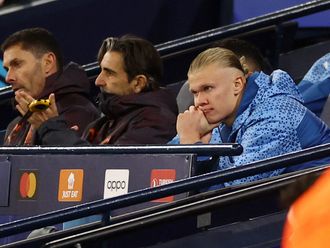Moscow: Lamine Diack, the 80-year-old head of world athletics, says his number one aim before standing down in two years’ time is to ensure his sport is available to every child, in every school in the world.
In a wide-ranging, exclusive interview with Reuters on Saturday, the President of the International Association of Athletics Federations (IAAF) looked back not only at his 14 years in charge but at his own days as a champion long jumper in his native Senegal.
He talked about how excited he was when he first saw Usain Bolt as a 14-year-old, how he cried when he heard about Marion Jones’s doping revelations and how the latest set of positive tests from Jamaica are a good thing for the sport he still loves with an undying passion.
Speaking at his Moscow hotel on the penultimate day of the world championships, Diack considered the Moscow event a success and was unperturbed by the backdrop of Russia’s controversial anti-gay propaganda law.
“I think it’s been a really good championships, especially coming in a post-Olympic year,” he said.
“Russia has its laws that need to be respected. We come here for athletics and each can do what he wants in his private life.
“In the championships so far, I have three personal highlights,” said Diack, a talented sportsman in his youth.
“Mo Farah doing the double, that was fantastic, and Shelly Ann Fraser-Pryce winning both sprints.
“But I also really enjoyed the high jump with Bohdan Bondarenko and as a long jumper myself I was really happy to see Aleksandr Menkov jumping so well and the crowd supporting the field events.” Diack said he was not concerned about the terrible crowds in the morning sessions but was happy to see the evenings gradually getting fuller after some paltry attendances in the early days.
“Actually, we’re used to it being quite empty in the mornings at the world championships,” he said. “The Beijing Olympics, when it was full for the marathon and nothing else was on, and London, of course, were different.” Organisers have promised a sold-out Luzhniki Stadium for the last two days, when Bolt will seek to add the 200 metre and 4x100 metre relay golds to his 100 metre win.
Diack said it was impossible to over-estimate the Jamaican’s importance to the sport, especially during its latest rocky ride on the drugs front.
“He is the top star not just of athletics but of all sport and fortunately he’s ours,” he said.
“He’s a wonderful guy and hugely important for our sport.
“I first came across him when he was 14, running in the Bahamas. I said ‘this boy will run under 43 seconds for the 400 metres’ (Michael Johnson’s 14-year-old world record is 43.18) — I didn’t see him as a 100 metre runner as he was so tall.
“And I still think it’s coming.
“When he became such a star I spoke to him and his coach and told him he had to be careful because he is a hero for the youth of the world, and he said he would do his best.
“So when he had that accident, driving barefooted after dancing, I said to him — ‘if you have to go to a party until 4am then pay a driver.” While Bolt and Fraser-Pryce are flying the flag proudly for Jamaica, positive drugs tests for top-line sprinters Asafa Powell, Veronica Campbell-Brown and Sherone Simpson have painted the Caribbean island in a different light.
Anti-doping progress
Diack, however, welcomed the tests as a sign of progress.
“What happened there was a good step for us because Jamaica is now able to do anti-doping,” he said. “It was Jamaican anti-doping that exposed Powell and with places like Kenya and Ethiopia able to do their own tests then we are moving forward.” Diack is also delighted that the IAAF agreed last week to return to four-year bans from 2015.
Their next target in the never-ending fight against the cheats is to target those around the athletes — the managers, agents, coaches and nutritionists who they believe should share responsibility.
“We are working very closely with the IOC on this and fortunately the entourage commission is led by Sergey Bubka,” he said of the Ukrainian pole vault great who is in the running to succeed Diack when he stands down in 2015.
“Look at Tyson Gay — he’s paying a coach, a manager, a physio but he said that someone let him down. So we need to find out from him what happened to help us take sanctions.
“We have to push countries to look at the law about people selling what they’re calling supplements. When I competed I lived off rice and fish and the only supplement I took was an occasional steak.
“We need to educate people on supplements, but some issues are governmental — we can’t open people’s bags or go into their hotel rooms.” Drugs issues, of course, are nothing new to athletics and Diack said one of his worst moments in the sport was when American Marion Jones was exposed.
“That was a disaster,” he said. “I was crying when I found out.
“We would love to get her to come to out athletes’ commission and explain why she did it.
“I knew she was gifted when she was young so didn’t think she was a cheat but I think maybe it was the pressure of Sydney (2000 Olympics).
“They gave her the challenge of doing better than Jesse Owens and Carl Lewis by getting five golds and I think that got to her.” While the superstars of the sport will always be a spur to the next generation, Diack said the best way to ensure the future good health of athletics is to make it available to all.
“The IAAF ask me what I want to leave as my legacy and I say I want to see athletics back in the schools, everywhere,” he said.











